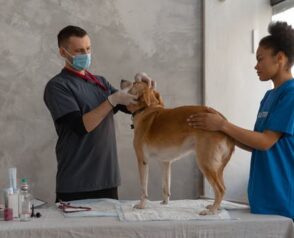When it comes to the health and well-being of our furry friends, we often focus on aspects like nutrition, exercise, and regular check-ups. However, dental care is a crucial yet often overlooked aspect of pet health. Just like humans, pets can suffer from dental problems that can impact their overall health and quality of life. This is where veterinary dentistry comes into play, ensuring our beloved companions maintain healthy smiles.
Pet Periodontics and Veterinary Dentistry
In this section, we delve into the science behind pet periodontics and the vital role of veterinary dentistry. We’ll also discuss the importance of veterinary nutritional consulting, pet vaccinations & parasite prevention to keep your furry friend smiling.
Understanding Pet Periodontics
Periodontics refers to the study and treatment of periodontal diseases, which affect the supporting structures of teeth, such as the gums, periodontal ligament, and alveolar bone. In pets, periodontal disease is one of the most common dental conditions, affecting most dogs and cats by age three. This disease begins with the accumulation of plaque, a sticky film containing bacteria, on the teeth. Over time, if not removed, plaque can harden into tartar and cause inflammation of the gums (gingivitis). If left untreated, gingivitis progresses to periodontitis, leading to tooth loss and even systemic health issues, as bacteria from the mouth can enter the bloodstream.
The Role of Veterinary Dentistry
Veterinary dentistry is crucial in preventing, diagnosing, and treating dental problems in pets. Veterinarians with specialized training in dentistry are equipped to perform various procedures, including dental cleanings, extractions, and root canal treatments. They may also utilize advanced techniques such as dental radiography (X-rays) and oral surgery to provide comprehensive dental care.
Regular Dental Care
Maintaining good oral hygiene is essential for pets. Regular visits to your veterinarian for teeth cleanings can prevent these issues and ensure your pet’s teeth stay healthy and functional. Pet owners can actively prevent periodontal disease by incorporating dental care into their pets’ routines. Regular brushing with pet-safe toothpaste, using appropriate chew toys, and offering dental diets or treats can help control plaque buildup. However, it is essential to note that while home care is beneficial, it should not replace professional veterinary dental care.
The Benefits of Pet Periodontics
Promoting good oral health in pets has numerous benefits. Beyond maintaining a sparkling smile, proper dental care can enhance a pet’s overall well-being. By preventing or treating periodontal disease, veterinary dentistry helps to alleviate pain and discomfort associated with dental problems. Additionally, addressing dental issues can reduce the risk of systemic health problems, such as heart disease and kidney disease, linked to poor oral health in pets.
Ensuring Optimal Nutrition Through Veterinary Nutritional Consulting
Pets require a balanced diet to maintain their overall health. Sometimes it can be challenging for pet owners to know how to meet their pet’s unique dietary requirements. That’s where a cat nutritional specialist can help.
Working with a cat nutritional specialist can uncover deficiencies or excesses in your pet’s diet. They can also help manage chronic conditions like diabetes or kidney disease through personalized nutrition plans. Ultimately, they guide pet owners in providing the best possible nutrition for their pets.
Protecting Your Pet with Routine Pet Vaccinations & Parasite Prevention
Vaccinations play a vital role in your pet’s overall health. Routine pet vaccinations safeguard them against common diseases like distemper, rabies, and parvovirus.
In addition to vaccinations, many pet owners turn to parasite-prevention treatments to ward off pesky and harmful vermin. Preventative measures include monthly medications for flea, tick, and heartworm prevention.
Remember, prevention is always better than treatment. Keeping up with your pet’s vaccinations and parasite control measures ensures a healthier and happier life for your furry friend.
Conclusion
The science behind your pet’s smile is more attainable than it might seem. By providing appropriate nutritional consulting from a trained specialist, ensuring dental health through regular cleanings and dental surgery interventions, and adhering to vaccination schedules and parasite prevention measures, you’ll set your pet up for a lifetime of health and happiness. Feel free to consult with a veterinary professional for guidance on any of these aspects of pet care. Remember, keeping your pet smiling means looking at the bigger picture of their overall well-being.





